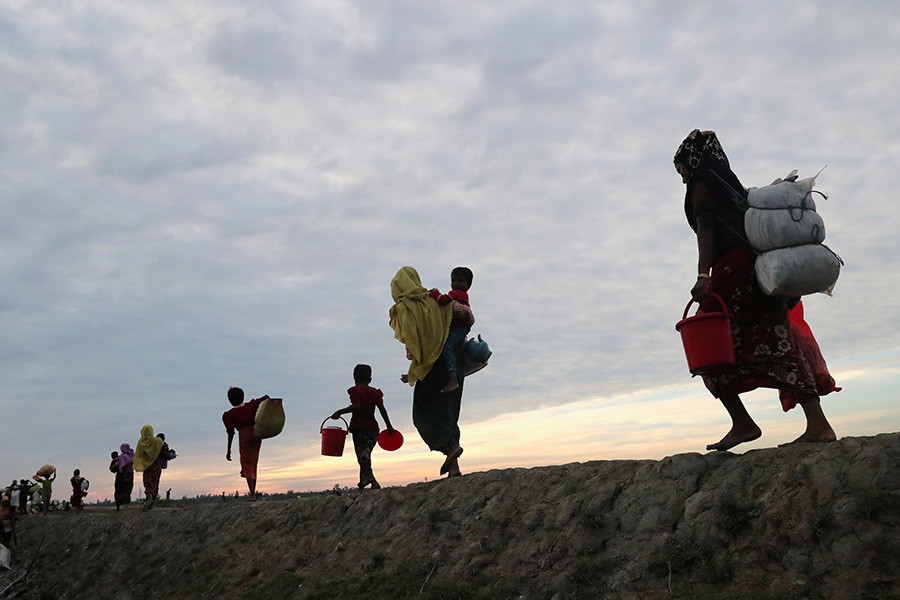The government said it cannot say exactly when it can start the process of Rohingya repatriation, after missing the January deadline.
According to an 'arrangement' signed between Myanmar and Bangladesh in last November in Myanmar's capital, the repatriation was supposed to start in January this year.
But the latest development proved that it cannot be started 'very soon' as pledged by the top rung of the foreign ministry of Bangladesh.
"We cannot give you any deadline," Foreign Minister AH Mahmood Ali said when asked whether he was convinced that the repatriation would start soon.
"But we are hopeful."
According to the foreign relations experts, Bangladesh has now become the hostage of the will of Myanmar on this issue.
"It has been proved by now that Myanmar is playing far smarter diplomacy than us," Humayun Kabir, former ambassador, told the FE Monday.
"When we signed the 'arrangement', we should have foreseen the endgame," the diplomat said.
It has become apparent that Myanmar has inked the deal just to avert the international pressure, he argued.
Since Bangladesh signed the arrangement with Myanmar, many powerful countries are now advising Dhaka to resolve the problem bilaterally, said a former Bangladesh ambassador to Myanmar requesting anonymity.
But foreign secretary Shahidul Haque told the FE Bangladesh has kept both the options open.
"We have told them (Myanmar) that if we are not satisfied we shall try to resolve the issue in multilateral forums," he added.
About the prospect of staring the repatriation, he said that repatriating a large number of refugees is not an easy task.
"It will take time and we are trying our best," he said.
According to the latest discussion between Myanmar and Bangladesh, the Rohingya would be repatriated after verification.
But out of more than one million refugees, who fled Myanmar in the face of military crackdown, only over 1,500 Rohingyas were verified.
Bangladesh sent a list of 8,000 Rohingyas to Myanmar and until date the neighbouring country verified around 1,500, a foreign ministry official told the FE.
When asked to comment on the slow pace of verification, the foreign minister admitted that the process was going on in "a very slow pace."
'Now you can ask that if things are going on at such a slow pace how long it will take to repatriate such a huge number of refugees?"
"But I am optimistic," he said.
The foreign minister disclosed that during the meeting between Prime Minister Sheikh Hasina and the United Nations Security Council delegation, representatives of Russia and China assured Dhaka of expediting the repatriation process.
But the reality was different.
Both countries opposed the move to condemn Myanmar during the UNSC meeting on their return to New York, he added.
Meanwhile, the Myanmar government claimed dozens of Rohingya Muslims who fled to the neighbouring Bangladesh have returned voluntarily and will be sent to a transit centre pending resettlement, according to a Singaporean Straits Times report.
A total of 58 Rohingyas have crossed back into Myanmar after they could "no longer find it tenable" to live in Bangladeshi refugee camps, said a statement published in the Myanmar state media Monday.
The statement was issued by the office of Myanmar's de facto leader Aung San Suu Kyi.
They were detained for failing to follow proper repatriation procedures until the decision to "pardon" them and allow them to resettle in Myanmar, the statement said.
They would be "temporarily" housed in a transit camp.
The returnees entered Myanmar in different stages over the last four months, said Suu Kyi spokesman Zaw Htay.
Myanmar did not give any information of the group's members and Bangladeshi authorities said they were unaware of any details.
The UN has said the conditions in Rakhine are not ripe for repatriation.
"The government of Myanmar is busy telling the world that it is ready to receive Rohingya returnees," said UN Assistant Secretary-General for Human Rights Andrew Gilmour in March.
But "at the same time its forces are continuing to drive them into Bangladesh," he said.
"Safe, dignified and sustainable returns are of course impossible under current conditions," he added.


